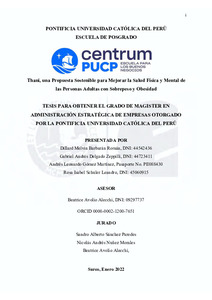| dc.contributor.advisor | Avolio Alecchi, Beatrice Elcira | |
| dc.contributor.author | Barbaran Roman, Dillard Melvin | |
| dc.contributor.author | Delgado Zeppilli, Gabriel Andres | |
| dc.contributor.author | Gomez Martinez, Andres Leonardo | |
| dc.contributor.author | Schuler Leandro, Rosa Isabel | |
| dc.date.accessioned | 2022-03-03T15:28:08Z | |
| dc.date.available | 2022-03-03T15:28:08Z | |
| dc.date.created | 2022 | |
| dc.date.issued | 2022-03-03 | |
| dc.identifier.uri | http://hdl.handle.net/20.500.12404/21728 | |
| dc.description.abstract | Se resume el proceso mediante el cual se identificó un problema y se planteó una solución
aplicando metodologías ágiles para generar un modelo de negocio sostenible que brinde
beneficios a los diferentes actores del ecosistema. La solución se llama Thani y busca
impactar en la salud de las personas adultas con sobrepeso y obesidad, reduciendo su peso y
mejorando su bienestar mediante actividades divertidas y generando hábitos saludables.
Durante el proceso de diseño, se validaron diversas hipótesis relacionadas a la deseabilidad
del modelo de negocio realizando pruebas de uso del prototipo de solución con los usuarios,
obteniendo como resultado que estos estarían dispuestos a usar la solución. También se
validaron hipótesis relacionadas con la factibilidad de las proyecciones de venta en relación
con el presupuesto de marketing mediante una simulación Montecarlo. Además, se validó
que, bajo diversos escenarios de variaciones en la venta y el presupuesto de marketing, el
valor del proyecto se asemeja al esperado. Finalmente, también se validó la hipótesis de
viabilidad financiera y necesidades de efectivo que tendría el proyecto de acuerdo con
diversos escenarios de crecimiento. Se concluye que Thani es un modelo de negocio que
genera valor económico y social a partir de la recopilación y uso de la información de
consumo de los clientes. Se debe indicar que la solución está alineada con algunos ODS,
como alcanzar la meta 3.4 del ODS 3, reduciendo la mortalidad prematura por enfermedades
no transmisibles. En el ámbito financiero, Thani genera valor debido al crecimiento
exponencial de sus ventas, los bajos costos variables y un CAPEX de S/7,720,000 en el año
inicial. Finalmente, se proyecta un VAN de S/.42’874.068 millones, una TIR de 42% y un
VAN social de S/24,004,766 millones, recomendándose ejecutar la idea de negocio. | es_ES |
| dc.description.abstract | The process through which a problem was identified and a solution was proposed is
summarized, the use of agile methodologies generating a sustainable business model that will
provide benefits to the different actors of the ecosystem. The solution is called Thani and
seeks to impact the health of overweight and obese adults to lose weight and improve their
well-being through fun activities and generate healthy habits. During the design process,
various hypotheses related to the desirability of the business model were validated by
performing various tests of use of the solution prototype with the user, obtaining as a result
that users would be willing to use the solution. Hypotheses related to the feasibility of the
sales projections in relation to the marketing budget were also validated using a Monte Carlo
simulation. It was validated that, under various scenarios of variations in the sale and the
marketing budget, the value of the project is similar to that expected. Finally, hypotheses of
financial viability and cash needs that the project would have in accordance with various
growth scenarios were also validated. It is concluded that Thani is a business model that
generates economic and social value from the collection and use of customer consumption
information. It is aligned with several SDGs in main to achieve goal 3.4 of SDG 3 by
reducing premature mortality from non-communicable diseases. It generates financial value
due to the exponential growth of its sales, low variable costs and a CAPEX of S/7,720,000 in
period 0. A NPV of S/42’874.068 million is projected, an IRR of 42%; likewise, a Social
NPV of S/24,004,766 million. The team is encouraged to be able to execute the business idea. | es_ES |
| dc.language.iso | spa | es_ES |
| dc.publisher | Pontificia Universidad Católica del Perú | es_ES |
| dc.rights | info:eu-repo/semantics/openAccess | es_ES |
| dc.rights | Atribución-NoComercial-SinDerivadas 2.5 Perú | * |
| dc.rights.uri | http://creativecommons.org/licenses/by-nc-nd/2.5/pe/ | * |
| dc.subject | Obesidad--Perú | es_ES |
| dc.subject | Salud pública--Perú | es_ES |
| dc.subject | Planificación estratégica | es_ES |
| dc.title | Thani, una propuesta sostenible para mejorar la salud física y mental de las personas adultas con sobrepeso y obesidad | es_ES |
| dc.type | info:eu-repo/semantics/masterThesis | es_ES |
| thesis.degree.name | Maestro en Administración Estratégica de Empresas | es_ES |
| thesis.degree.level | Maestría | es_ES |
| thesis.degree.grantor | Pontificia Universidad Católica del Perú. CENTRUM | es_ES |
| thesis.degree.discipline | Administración Estratégica de Empresas | es_ES |
| renati.advisor.dni | 09297737 | |
| renati.advisor.orcid | https://orcid.org/0000-0002-1200-7651 | es_ES |
| renati.author.dni | 44542436 | |
| renati.author.dni | 44723411 | |
| renati.author.dni | 45060915 | |
| renati.author.pasaporte | PE088430 | |
| renati.discipline | 413307 | es_ES |
| renati.juror | Sandro Alberto Sanchez Paredes | es_ES |
| renati.juror | Nicolás Andrés Núñez Morales | es_ES |
| renati.juror | Beatrice Elcira Avolio Alecchi | es_ES |
| renati.level | https://purl.org/pe-repo/renati/level#maestro | es_ES |
| renati.type | https://purl.org/pe-repo/renati/type#tesis | es_ES |
| dc.publisher.country | PE | es_ES |
| dc.subject.ocde | https://purl.org/pe-repo/ocde/ford#5.02.04 | es_ES |






